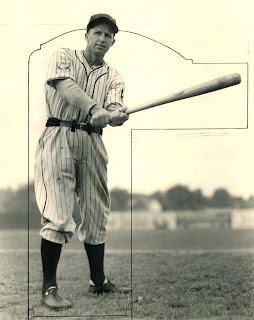
On April 4, 1939, Carnegie was re-signed by the Bisons, making it his ninth season with the team. That season, like the last would prove to be a stellar one for Carnegie as he batted .294 with 29 home runs. His long ball total again led the International League. From this point on, Carnegie's offensive totals took a dip, hitting 15 home runs in 1940 and seven in 1941. On January 2, 1942, at the age of 42, the once king of Buffalo baseball was released from his contract. Bisons general manager John Stiglmeier later stated that it was "the hardest thing [he] ever had to do".
Although Carnegie's tenure ended in Buffalo, his playing career did not. He joined the Lockport White Sox of the Class-D PONY League that season, batting a respectable .310 with 16 home runs. He did not play professionally in 1941, but returned in 1942, joining the PONY League Jamestwon Falcons. He also managed the team that year. On the season, he batted .305 in 94 games while the Falcons as a team went 70-54.
In what was one last season of glory, the Buffalo Bisons brought Carnegie back in 1942. Carnegie, who was 46, batted .301 in 39 games. That season would be his last as a player in professional baseball, but he didn't stay completely out of the game. After his last season, the Bisons hired him as a scout and Carnegie and his family set-up shop in Buffalo, New York, where he stayed until his death in 1976.
Carnegie was in some respects the typical minor league player. He worked as a security guard during the off-season to stay fit and help support his family. But in other regards, Carnegie is in a league of his own. To this day, he holds the all-time International League home runs and run batted in record with 258 and 1,044, respectively. He holds the Buffalo Bisons single-season home run record with 45 and is the Bisons all-time doubles (249), games played (1,273), hits (1,362), home runs (258), and run batted in (1,044) leader. Carnegie was an inaugural member of the International League Hall of Fame in 1947 and was also inducted into the Buffalo Baseball Hall of Fame in 1985 and the Greater Buffalo Sports Hall of Fame in 1992. He will be forever remembered as one of the greatest Bisons in history.
Many comment that if it Carnegie hadn't waited until he was was 31 to start playing pro-ball regularly, he would have been an outstanding major leaguer. But Carnegie seemed content with his honest job in the steel mills of his home town, playing semi-pro ball when he could with the local sandlot stars, later joining he pro-circuit to pick up where he left off in Pittsburgh. It's easy for us to now comment about the "should haves" and "could haves" of his career, but there's no question that Ollie Carnegie was one of the greatest minor leaguers of all time.




